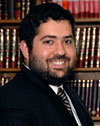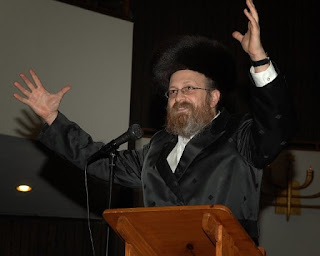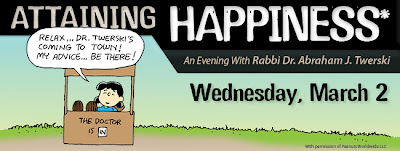The second shiur from the YU Torah Mitzion Kollel of Chicago’s Tomer Devorah chabura was just posted online, here. The shiur, “Mi Kel Kamocha, Patience and Anger“, discusses the first middah. Rabbi Etan Ehrenfeld touches on the importance how Hashem is always patient with us and says over in important teaching from Rav Dessler zt”l. Take a listen and if you’re in Chicago, come to Congregation KINS this Sunday and join us from 8pm-9pm!
Category Archives: mp3 shiurim
Tomer Devorah shiur #1 now online
 |
| Rabbi Etan Ehrenfeld |
The first shiur from the YU Torah Mitzion Kollel of Chicago’s Tomer Devorah chabura was just posted online, here. The shiur, “V’halachta B’drachav”, is based on the the Ramak’s intoduction to the sefer and Rabbi Etan Ehrenfeld brings in an article from the Rav and Sefer HaMitzvos in helping to understand the how we can be similar to our Creator. It’s worth a listen and is a great way to prepare for this Sunday’s class at Congregation KINS from 8pm-9pm!
Chief Rabbi Sir Jonathan Sacks on how to daven
On Wednesday, October 26th the Chief Rabbi Sir Jonathan Sacks spoke in Chicago at Congregation K.I.N.S. A link to the audio and a transcript can be found here.
Here’s an amazing story he told over (from the transcript):
I don’t know if you know this, the Rebbe before he became the Lubavitcher Rebbe, ran the publishing house of Chabad, Kehot. He always used to typography and use signals that would tell the apprentice how to make a change. Somebody had written him a letter, “I need the Rebbe’s help. I’m depressed, I’m miserable, I find life has no meaning. I pray and it doesn’t affect me, I do mitzvos and I don’t feel change – I need the Rebbe’s help.” And the Rebbe gave him the most brilliant reply and he did not use a single word. You know what he did? He just ringed the first word in every sentence. What was the first word? I. If all that matters to you is the “I,” you will never find happiness. And that, I discovered, is the secret of Kohelet’s unhappiness. Remember what he says? Asiti, kaniti, baniti li, asafti li. Everything – I built for myself, I bought for myself, I gathered for myself. There is no book in the whole of Tanach which uses the first person singular that often. And if you use the first person singular, if all that matters is I, you will never be happy. And what happened in our generation? I really intend no disrespect to the memory of a wonderful man, Steve Jobs. He was a wonderful man. Be we are the 1—generation. We have the iPad, the iPhone, the iTunes, the iPlayer, ich veis nisht, everything is I I I. No wonder we’re miserable. And the result is that we have to use davening, to thank Gd for what we have and to be aware of something bigger than ourselves.
Shiur by Rav Weinberger on Elul, posted at yutorah.org
YUTorah.org just posted a shiur given by Rav Moshe Weinberger on September 12, 2011.
The shiur “Achas Shaalti-Elul” is available to listen to or download here.
Good links for Elul
So, it officially Elul. Here are a few links you might like.
Rabbi Micha Berger just started writing about the sefer Shaarei Yosher by Rav Shi’mon Sh’kop (who was the rebbe of Reb Dovid Lifshitz).
Rabbi Revuen Brand, Rosh Kollel of the YU Torah MitzionKollel of Chicago has a great shiur available to listen to or download titled, The Character of Elul.
Also, Elul wouldn’t be Elul with posting a link to “Elul in Slabodka“.
In Rav Moshe Weinberger’s Perkei Avos shiurim that I listened to this past Sunday, while biking, he mentioned a few ideas that I’d like to expand upon, L’zecher Nishmas the 4th yahrzeit of Rivka bas Chaim Yosef a”h, my mother-in-law.
Rav Weinberger asks (in the 2st shiur) a question based on the Marahal’s Derech Chaim, “Why does the first mishna start of stating that Moshe received the Torah from Har Sinai, instead of stating that the Torah was received from Hashem?”
Har Sinai was more than just a place, it was a way of life. The location was chosen by Hashem, just like we, B’nai Yisrael were chosen by Hashem. Har Sinai was a constant, a visible force. It was also chosen because of its’ size and the middah of humility, as many of our children have learned in pre-school. To be someone that receives Hashem’s Torah, means that you are willing to receive from anyone who can teach you. It’s is we, like Moshe, who have to be willing to learn what anyone is willing to teach us, no matter if they are a Gadol or a Katon.
Peirkei Avos, Rav Weinberger says, is called “Avos” because the Torah within these Mishnayos are based on a mesorah that goes back and is rooted in the yashrus, the ehrlichkeit, middos, and derech eretz of our Avos and Imos. Avraham, Yitzchak, Yaaov, Sara, Rivka, Rochel, and Leah, like Har Sinai, taught us how to be m’kabal not just the Torah but a Torah lifestyle of middos tovos. Perkei Avos isn’t just the textbook for a course on how to “act frum” it’s teaches you how to live a frum life. The Avos and Imos, but the Avos gave over the passion of the one writing the textbook. My wife’s mother was a prime example of this. She knew what it meant to be frum, to love Hashem, to have a relationship with Hashem. She gave that over to those she knew, especially to Joanie.
Later in the 3rd shiur, Rav Weinberger gives an insight into the first thing said by the Anshei Knesses Gedolah, “Be deliberate in judgment.” This teaching is so important when viewed within context of what was happening to the generation at the that time. It was the end of the era of Nevu’ah, prophecy, and B’nai Yisrael felt that Hashem was abandoning them. The Mabit (Rav Moshe be Yosef of Tirani) says that being “deliberate in judgment” doesn’t refer to how we view other people, but how we view the events that happen to us in life.
Din is always related to examining every detail of a situation, looking at things from all sides. He says that we should always realize, even if the darkest times when we no longer have Naviim, that Hashem is always with us. This is what the Anshei Knesses Gedolah was teaching their generation.
When we are able to “be deliberate in judgment” and see how each detail in our life is connected to another detail, then the outcome can only be that Hashem is with us. This was a middah that Rivka bas Chaim Yosef had perfected. My mother-in-law never looked at tragedy, loss, or any difficulty as a punishment from Hashem. She always knew that Hashem was constantly with her, watching, guiding, and protecting. We should all be zoche to take this middah from Bubbie and giving it over to our own children.
Excellent interview with R/Dr Twerski and an opportunity to see him in Chicagoland
 R Micha Berger clued me in that last week Zev Brenner interviewed both R/Dr Abraham Twerksi and also his son Dr Benzion Twerksi. The interview deals with a number of issues within the observant community and solutions. It’s available to listen to or download here.
R Micha Berger clued me in that last week Zev Brenner interviewed both R/Dr Abraham Twerksi and also his son Dr Benzion Twerksi. The interview deals with a number of issues within the observant community and solutions. It’s available to listen to or download here.
An Evening with Rabbi Dr. Abraham J. Twerski
at Niles West High School Auditorium
5701 Oakton Street, Skokie
Tickets:Advance Online: $15 or at the Door: $20
Purchase tickets here
R Moshe Weinberger on how to save this generation
 |
| Picture available for purchase here |
The only thing that will save this generation, the secret to saving our generation is not how we can pull out more plugs from more machines. They’re always ahead of us. They always have other machines. And just when you though you could control what the kid is sending with text messages, someone told me last year that the kid can go to the store and get a disposable cell phone, that nobody even knows about. There’s no bill that is ever is ever sent to the house. There’s always some other way. When a person is in this world, there’s always a way.
So they can have a thousand conferences and meetings about “How can you take away the pleasures of the children of this generation?” And if we can take away all their pleasures and make new yeshivas where there’s no sports, no smiling, “Smiling is not allowed”. No laughing, no happiness, no recess. Anybody that is caught wearing or with a smile in the “Kingdom of Sadness” will be banished from the school forever. Which also means that all of the sisters and brothers will never get shiduchim. They think of new way of how to save this generation. There’s only on way. The only way to save this generation, and it’s our responsibility, is to show them that Yiddishkeit is so geschmack, to lift them up to a place that is called “Al Cheit”- higher than that stuff.
Rav Avraham Shorr shiur about Tisha B’Av (link)
I am fairly stiff-necked. What I mean is that I don’t like to change. I like the idea of improvement and working on middos (thus my own gravitation towards Mussar), but this is mostly because I tend to resist change.
Last night I downloaded a shiur that, like it or not, is causing me to think about a number of things and might lead to change. If you’ve ever seen or heard Rav Avraham Schorr, then you know that he tends to tell it like its, but with a level of clarity that few have in our generation, IMHO.
The shiur I downloaded regarding Tisha B’Av is available from TorahLectures.com, here.
Biking the Drive
-
Avraham ben Zorah a”h
-
Rivka bas Chaim Yosef a”h
-
Dan Halevi ben Ovadia a”h
-
Pesha bas Shmuel a”h
-
Yakov ben Rav Avraham Yosef a”h
-
Efraim ben Shlomo a”h
-
Reuven ben Tova Chaya
-
Esther bas Sara
-
Yenta Tzarna bas Etya
-
Ayelet bas Nurit
After resting for some of the day, we all drove to Six Flags, since the kids didn’t have school on Memorial Day, and hung out for the evening. It was a great way to end perfect day.
I biked a total of 45 miles (I tied with only one other person for the the longest distance biked) and my sponsorship totaled over $2,800.00, which was the highest amount raised in Chai Lifeline’s Bike the Drive history…thanks to all of my sponsors.
As I had previously written, I dedicated this year’s ride to the memory of my father, Al Harris a”h, who passed away in early November. He not only sponsored me, but was always amazed by my commitment to Biking the Drive and was very proud of my efforts both in terms of biking and also in attempting to help an important organization like Chai Lifeline. I know he would have been very proud of what was accomplished on Sunday.
For those of you who sponsored and encouraged me, thank you!!!






